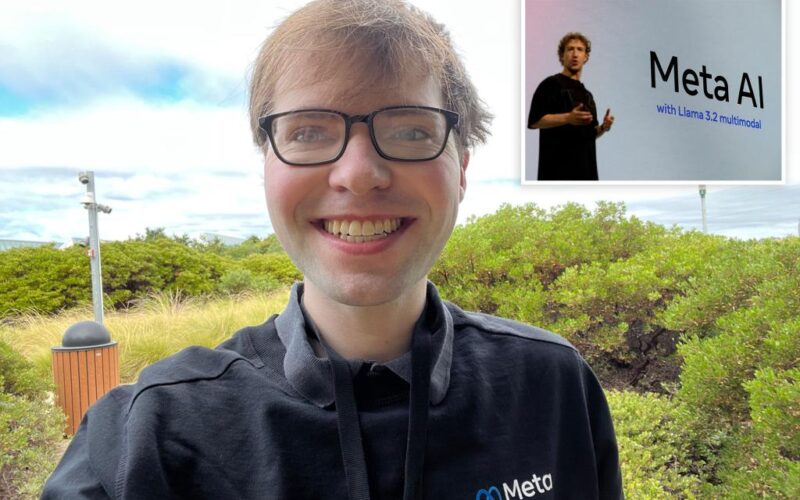Mark Zuckerberg’s Meta gave a 24-year-old artificial intelligence whiz a staggering $250 million compensation package, raising the bar in the recruiting wars for top talent — while also raising questions about economic inequality in an AI-dominated future.
Matt Deitke, who recently dropped out of a computer science doctoral program at the University of Washington, initially turned down Zuckerberg’s “low-ball” offer of approximately $125 million over four years, according to the New York Times.
But when the Facebook founder, a former whiz kid himself, met with Deitke and doubled the offer to roughly $250 million — with potentially $100 million paid in the first year alone — the young researcher accepted what may be one of the largest employment packages in corporate history, the Times reported.
“When computer scientists are paid like professional athletes, we have reached the climax of the ‘Revenge of the Nerds!’” Professor David Autor, an economist at MIT, told The Post on Friday.
Deitke’s journey illustrates how quickly fortunes can be made in AI’s limited talent pool.
After leaving his doctoral program, he worked at Seattle’s Allen Institute for Artificial Intelligence, where he led the development of Molmo, an AI chatbot capable of processing images, sounds, and text — exactly the type of multimodal system Meta is pursuing.
In November, Deitke co-founded Vercept, a startup focused on AI agents that can autonomously perform tasks using internet-based software. With approximately 10 employees, Vercept raised $16.5 million from investors including former Google CEO Eric Schmidt.
His groundbreaking work on 3D datasets, embodied AI environments and multimodal models earned him widespread acclaim, including an Outstanding Paper Award at NeurIPS 2022. The award, one of the highest accolades in the AI research community, is handed out to around a dozen researchers out of more than 10,000 submissions.
The deal to lock up Deitke underscores Meta’s aggressive push to compete in artificial intelligence.
Meta has reportedly paid out more than $1 billion to build an all-star roster, including luring away Ruoming Pang, former head of Apple’s AI models team, to join its Superintelligence Labs team with a compensation package reportedly worth more than $200 million.
The company said capital expenditures will go up to $72 billion for 2025, an increase of approximately $30 billion year-over-year, in its earnings report Wednesday.
While proponents argue that competition drives innovation, critics worry about the concentration of power among a few companies and individuals capable of shaping AI’s development.
Ramesh Srinivasan, a professor of Information Studies and Design/Media Arts at UCLA and founder of the university’s Digital Cultures Lab, said the direction that companies like Meta are taking with artificial intelligence is “foundational to why our economy is becoming more unequal by the day.”
“These firms are awarding hundreds of millions of dollars to a handful of elite researchers while simultaneously laying off thousands of workers—many of whom, like content moderators, are not even classified as full employees,” Srinivasan told the New York Post.
“These are the very jobs Meta and similar companies intend to replace with the AI systems they’re aggressively developing.”
Srinivasan, who advises US policymakers on technology policy and has written extensively on the societal impact of AI, said this model of development rewards those advancing large language models while “displacing and disenfranchising the workers whose labor, ironically, generated the data powering those models in the first place.”
“This is cognitive task automation,” he said. “It’s HR, administrative work, paralegal work — even driving for Uber. If data can be collected on a job, it can be mimicked by a machine. All of those forms of income are on the chopping block.”
Asked whether universal basic income might address mass displacement, Srinivasan, who hosts the Utopias podcast, called it “highly insufficient.”
“Yes, UBI gives people money, but it doesn’t address the fundamental issue: no one is being paid for the data that makes these AI systems possible,” he said.
On Wednesday, Zuckerberg told investors on the company’s earnings call: “We’re building an elite, talent-dense team. If you’re going to be spending hundreds of billions of dollars on compute and building out multiple gigawatt of clusters, then it really does make sense to compete super hard and do whatever it takes to get that, you know, 50 or 70 or whatever it is, top researchers to build your team.”
“There’s just an absolute premium for the best and most talented people.”
A Meta spokesperson referred The Post to Zuckerberg’s comments to investors.








